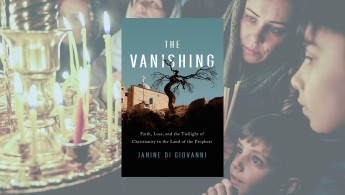The Vanishing: The Twilight of Christianity in the Middle East
One of the inexorable processes of the last few decades in the Middle East has been the decline and near disappearance of Christian communities in the lands where Christianity began, on the very earth where Jesus Christ walked. It is stark from Iraq to Egypt, from Jordan to Turkey. Many Christians have emigrated for a host of reasons.
These disappearing communities are the subject of the latest book of war reporter, Janine Di Giovanni. It is a very powerful personal account of her experience meeting people from these communities in Iraq, Gaza, Syria and Egypt with a chapter on each. It is a typical example of her vivid storytelling but also her courage as a war reporter. She highlights the nervous tension she faced in the run-up to the 2003 Iraq war.
Above all Di Giovanni allows Christians from the region to tell their stories through her. She quotes them extensively. It develops into a moving human account based on real people and their lived experiences. This may sound basic and obvious but sadly it seems such a rarity nowadays.
"Di Giovanni does not treat Christian communities in the Middle East as some special case demanding Christians worldwide to intervene to rescue. She situates them within their own countries, societies and communities, and highlighted the suffering those broader communities face"
The underlying trends and rationale for the book are truly grim. These historic communities have been leaving the region in droves for richer pastures. The true situation is not always clear.
In the case of Iraq for example, the lack of a census for over 30 years means the numbers leaving are at best guestimates. For Iraq, the 2003 war had a disastrous impact, triggering instability, economic insecurity and the rise of extremist groups, leading eventually to the Islamic State group (IS). She visits what is left of Qaraqoosh which pre-IS was the largest Christian city in Iraq. Through her interviews and visits, she paints the terrifying aftermath of massacres not least in Iraq and Egypt.
|
An added strength to this book is that Di Giovanni does not treat Christian communities in the Middle East as some special case demanding Christians worldwide to intervene to rescue. She situates them within their own countries, societies and communities, and highlighted the suffering those broader communities face. There is none of the Christians first approach typical of the likes of far-right evangelicals such as former US Vice-President Mike Pence.
Unlike this category, Di Giovanni is curious and empathetic towards Christians but not hostile to other faiths. She deals with the horrors their compatriots face like the massacres of the Yazidis in Iraq and the story of the Jews fleeing Iraq and elsewhere. She depicts Christian communities in their many guises pointing out the twelve differing Christian sects in Syria alone.
Di Giovanni also does not seek to point to one single cause for their vanishing presence as so many hostile bodies do. The Israeli authorities tell you that Palestinian Christians are leaving because of Hamas and such groups, but say nothing of the iniquities of their 54-year-old occupation.
"Christian communities are rightly anxious to be treated as Egyptians, Iraqis, Syrians and Palestinians as part of their country’s social fabric, not a plaything of the West or some mere minority group"
Palestinian Christians in Gaza now only number some 1,000 strong but they suffer the horrors of the Israeli blockade like every other Palestinian. The additional repression of Hamas only makes their lives harder. The Syrian regime will likewise claim that Syrian Christians love the regime, that it is their protector against Islamist extremism when the reality is far more nuanced.
Yet Di Giovanni points out that by 2015, 750,000 Syrian Christians had fled the country. The Egyptian regime blames the Islamists for the attacks on Egyptian Copts but of course, says nothing about the discrimination it fosters or its role in scapegoating Egyptian Christians for the country’s socio-economic ills.
This matters. Christian communities are rightly anxious to be treated as Egyptians, Iraqis, Syrians and Palestinians, as part of their country’s social fabric, not a plaything of the West or some mere minority group. This is how Di Giovanni presents them, in their proper context, historically, geographically and socially.
Are these communities dying out? Will they vanish? One hopes not even if Di Giovanni is not optimistic. Certain areas have suffered from sectarian cleansing and others may still. Will these communities be able to sustain church numbers? In some places, the answer may be the worst though it is hard at present to see this happening in Egypt where the Christian population remains so high.
Even if wars in Syria and Iraq fade away, if the most violent of extremists are forced into hiding, economic destitution and the lack of opportunity will remain powerful drivers of emigration for many years.
So as so much of the world starts counting down the days to Christmas, maybe it is time to reflect on the future of these indigenous communities, to hear and digest their stories. Di Giovanni is an eloquent guide and the pages of her book will illuminate our understanding of this region of the world at a time of great darkness.
Chris Doyle is the director of CAABU (Council for Arab-British Understanding). He is a regular opinion writer and commentator on the Middle East and has organised and accompanied numerous British parliamentary delegations to the region.
Follow him on Twitter: @Doylech



